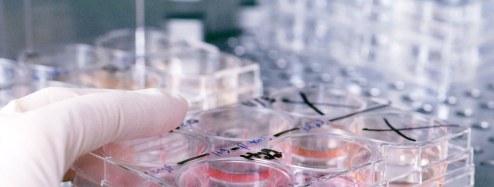
The radiopharmaceutical F-18 - EF5 is poised to take out the guesswork from deciding treatment for cancer patients. TRIUMF’s first F-18 - EF5 lung cancer hypoxia study patient was successfully scanned on July 8, 2008 at the BC Cancer Agency (BCCA). With a heightened understanding of the nature of cancerous tumors in the body, the clinical trial involving F-18 - EF5 has the potential to dictate prescribed treatment methods with more accuracy.
TRIUMF scientists have delivered the first doses of F-18 - EF5 to the UBC Hospital for a clinical study in patients. This represents the first successful clinical PET scan performed with F-18 - EF5 in Canada. Without the dedicated work of TRIUMF scientists Mike Adam, Kelly Worth, BCCA Oncologist Don Wilson and many others at BCCA, this milestone could not have been achieved.
How does F-18 - EF5 work? Hypoxia is a deficiency of oxygen in a part of the body. In cancerous tumors, the presence of hypoxia is a strong indication of resistance to conventional radiation treatment and some chemotherapy treatments. The “-EF5” part of the tracer is a nitroimidazole, which is biochemically reduced and trapped in hypoxic tissue. Once trapped, a PET scanner can image the tumor tissue. Currently, medical isotopes are used to image the location and size of a tumor in the body. Now, with studies underway with the tracer in F-18 - EF5, medical practitioners will be able to image the important characteristic of hypoxia. If successful, F-18 - EF5 will represent another tool in the medical imaging toolbox.
“We’re starting off with 20 patients,” says Mike Adam, Research Scientist at TRIUMF. “We’re going to analyze the data and decide if and when we should move to a large clinical study group.” This substance is currently a hot topic in the field of nuclear medicine and a few other laboratories around the world are studying its uses and effects as well. The University of Pennsylvania has also recently started clinical studies on F-18 - EF5.
TRIUMF scientists are looking forward to the results of the clinical trial and to continue work on F-18 - EF5.
By Nicole Dublanko
TRIUMF's Communications Assistant
